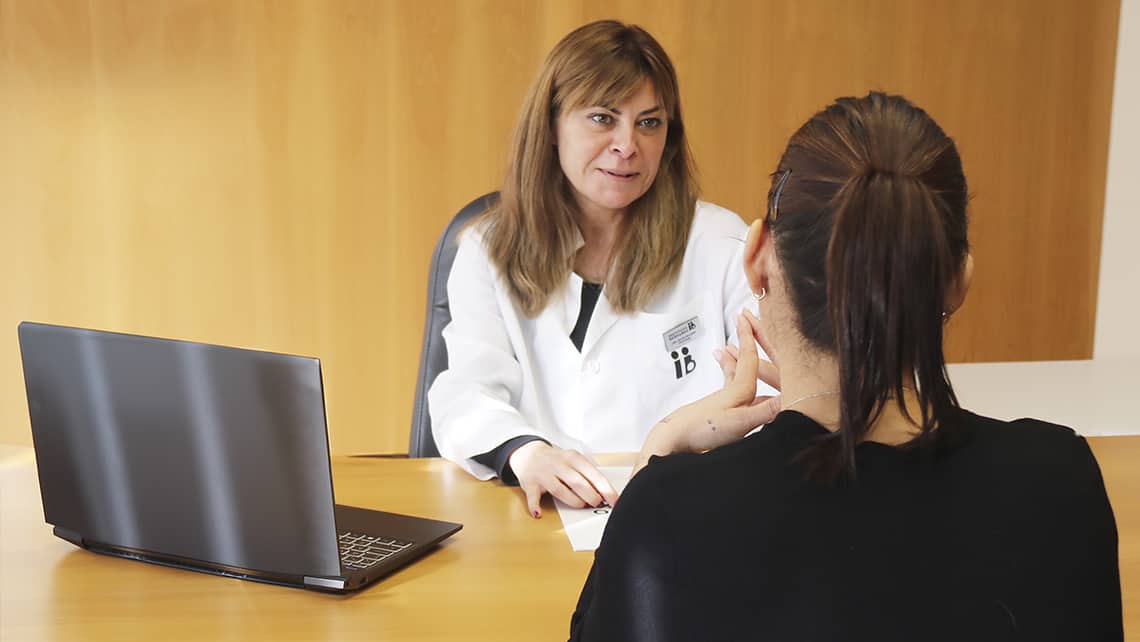Half of women suffering from endometriosis may have fertility problems
March, 18th 2024

- Around 500,000 Spanish women with endometriosis may suffer from infertility: it affects between 30% and 50% of patients.
- Real experience: “My periods have always been very painful, but we don’t have to normalise what is not normal”.
- One out of ten women of childbearing age suffers from this disease.
Hundreds of thousands of women suffer from endometriosis, a disease which is not always diagnosed but it causes enormous difficulties for those who suffer from it and can cause difficulties in female fertility. This condition affects 10% of women of reproductive age, and therefore affects 190 million women worldwide, according to the WHO, and 1,000,000 women in Spain.
Endometriosis is a chronic condition in which the tissue that normally lines the uterus (endometrium) grows outside it, often on the ovaries, fallopian tubes or other nearby organs. This results in severe pain women experience with each menstrual period and makes it difficult for them to go about their daily lives in a normal way.
This condition not only causes chronic pelvic pain and other symptoms, but can also have a significant impact on fertility. According to data provided by Instituto Bernabeu’s reproductive medicine specialists, between 30% and 50% of patients with endometriosis may experience difficulties in conceiving naturally. This means that around 500,000 Spanish women suffering from this disease could be at risk of infertility for this reason.
“Fertility problems caused by endometriosis are associated with factors such as the formation of adhesions that can block the fallopian tubes, altered oocytes quality and chronic inflammation, which can affect embryo implantation. However, with early diagnosis and leaving it in the hands of fertility specialists, it is possible to achieve pregnancy,” explains Dr Belén Moliner, Instituto Bernabeu’s Endometriosis Unit Coordinator.
Reduced embryo quality
Although fertility experts at Instituto Bernabeu stress that endometriosis is not synonymous with infertility, this disease incidence is associated with a reduced embryo quality and, consequently, the probability of gestation following IVF. “The presence of ovarian endometriosis reduces the amount of healthy ovarian tissue, and chronic inflammation leads to fibrosis of the ovarian tissue. This situation also affects the normal development of the oocytes, it can generate abnormalities in uterine contractility and even alter the patient’s microbiome and immune system, making it more likely for her to have a reduced ovarian reserve,” explains Dr Moliner.
However, the support of assisted fertility solutions can become key for women with endometriosis who are unable to achieve pregnancy naturally. “The woman’s age can worsen the infertility situation which is already bad due to the disease, so the advice that we, the experts, give is to vitrify the eggs as soon as possible in order to be able to postpone childbearing. If this is not possible, techniques such as Artificial Insemination, In Vitro Fertilisation (IVF) or Egg Donation can be used”, says Dr Moliner.
“I’ve have had very painful periods all my life”
Cristina, Sara and Sofía suffer from endometriosis. And what all three have in common is that they have become mothers despite being diagnosed with the disease. “Throughout my life, my periods have always been very painful,” says Sara, “but we don’t have to normalise what is not normal”.
“I’ve lived like this all my life. When your period comes, you take a pill and get on with your day. But these cramps can condition your life,” adds Cristina, who encourages women to “go to the doctor when we notice these symptoms. Don’t mind to be a pest, if a doctor tells you that this is normal, go back”
In Sofia’s case, “I had very strong pains that made me unable to cope,” she said. In fact, “I know of cases who have spent up to ten years without knowing what is was and suffering this pain”, she adds, so “you have to seek help if you need it, because it is a very difficult process that can affect you to the point of having to give up a career or not being able to go on holidays”.
Despite endometriosis “I got pregnant the first time and I would repeat the whole process a thousand times,” says Cristina. “My mother still can’t believe it when she sees my daughter,” says Sara. “And if the next one has to be the same, it will be just as wonderful,” according to Sofia, who adds that “it is very important to give more visibility to this disease so that any gynaecologist can help you and know how to detect endometriosis so that we don’t have to live with so much pain”.
